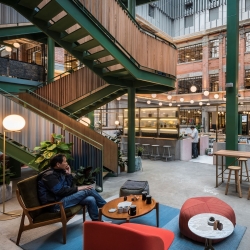To provide the best experiences, we use technologies like cookies to store and/or access device information. Consenting to these technologies will allow us to process data such as browsing behaviour or unique IDs on this site. Not consenting or withdrawing consent, may adversely affect certain features and functions.
The technical storage or access is strictly necessary for the legitimate purpose of enabling the use of a specific service explicitly requested by the subscriber or user, or for the sole purpose of carrying out the transmission of a communication over an electronic communications network.
The technical storage or access is necessary for the legitimate purpose of storing preferences that are not requested by the subscriber or user.
The technical storage or access that is used exclusively for statistical purposes.
The technical storage or access that is used exclusively for anonymous statistical purposes. Without a subpoena, voluntary compliance on the part of your Internet Service Provider, or additional records from a third party, information stored or retrieved for this purpose alone cannot usually be used to identify you.
The technical storage or access is required to create user profiles to send advertising, or to track the user on a website or across several websites for similar marketing purposes.
 New research from Globalization Partners Inc., claims more than 90 percent of employees who work for a global organisation describe their companies as diverse. However, a lack of understanding by the organisations themselves around how to manage this growing disparate and diverse workforce means that three out of ten respondents don’t feel a sense of inclusion or belonging due to remote working. This negatively impacts employee engagement, trust, happiness, as well as staff turnover. (more…)
New research from Globalization Partners Inc., claims more than 90 percent of employees who work for a global organisation describe their companies as diverse. However, a lack of understanding by the organisations themselves around how to manage this growing disparate and diverse workforce means that three out of ten respondents don’t feel a sense of inclusion or belonging due to remote working. This negatively impacts employee engagement, trust, happiness, as well as staff turnover. (more…)






















 Most executives around the world are out of touch with what it takes to lead effectively and for their businesses to stay competitive in the digital economy, a new
Most executives around the world are out of touch with what it takes to lead effectively and for their businesses to stay competitive in the digital economy, a new 
 Younger decision makers are increasingly relying on technology such as emails, video conferencing and WhatsApp in negotiations with suppliers, rather than speaking to them face-to-face, new research from
Younger decision makers are increasingly relying on technology such as emails, video conferencing and WhatsApp in negotiations with suppliers, rather than speaking to them face-to-face, new research from 







March 26, 2020
Now is a great time to talk about staff absence in the NHS
by Ian Caminsky • Comment, Wellbeing